Speech of the President of the Republic of Tajikistan H.E. Mr. Emomali Rahmon at Azerbaijan Diplomatic Academy
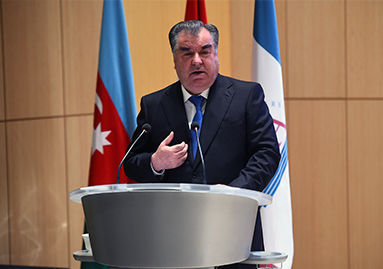
Distinguished Professors and Students,
Ladies and Gentlemen,
At the outset, let me extend my deep appreciation and profound gratitude to the Academic Council of Azerbaijan Diplomatic Academy for the honor accorded to me by conferring the degree of Honorary Doctor.
Azerbaijan Diplomatic Academy successfully combines the basic principles of classic academies with innovative aspirations of universities of new generation.
I see here a direct analogy with Azerbaijan itself – an ancient blessed land, which is an example of novelty and well-being. One of the main tasks of your Academy is to train highly qualified specialists on a wide range of issues of international relations.
We very well understand that main mission of diplomats, along with the maintenance and development of constructive cooperation among the subjects of international relations, is a comprehensive promotion of peace, stability and security. In this regard, I would like to avail this opportunity to share with you some of my thoughts on unique peace-building experience of Tajikistan.
Tajikistan faced severe difficulties and challenges at the beginning of its independence. The system of the unified set for normal operation of the former Soviet Union’s economy was destroyed. The Tajik economy has fallen down, the gap between economic ties led to sharp decline in production and the country’s GDP fell down by 70%.
The bitter fight between political powers of different directions arose on top of all of this.
Having availed the then prevailing situation in Tajikistan, some individual countries began implementing their far-reaching plans in a hurry. By the hands of political forces, they started implanting in our society their own culture and religious ideology, with a view to establishing an Islamic state in Tajikistan which was strange to our people.
As a result, our country turned into the field of severe fights between forces and powers, which were for secular regime and the groups, which media subtitled as “Demo-Islamic Alliance”.
This group was a powerful Islamist iceberg with a tiny, conditionally called «democratic” top like a folding screen. It widely used radical extremist methods of fight such as violence, murder, hostage taking, intimidation and threat. In their actions, the demo-Islamists reached the point that they declared all the non-Muslim population of the country their hostages. The Demo-Islamists even managed to usurp part of the government for some time.
After losing free presidential elections, by exerting pressure on the President, who was legally elected among nine presidential candidates, they managed to create the so-called «government of national reconciliation». Local armed conflicts between Islamists, on the one hand, and the supporters of secular system supported by more than ninety percent of the country’s population, on the other hand, soon evolved into full-scale hostilities.
Despite the fact that supporters of the constitutional system restoration won this fight, religious radical forces did not accept defeat. They moved to neighboring Afghanistan and, with the direct financial and military support of their foreign patrons, began to wage a systematic fight against the people’s power. In other words, the factor of external influence played a decisive role in escalating internal confrontation in Tajikistan.
A nation with a thousand-year history and ancient cultural traditions was dragged into the abyss of civil war imposed from the outside and brother raised weapon against brother. The armed conflict has become the greatest tragedy for us. Then we came face to face with all those tragic phenomena that we currently observe in Syria, Iraq, Yemen and Afghanistan.
Chaos reigned in the country, the fate of the people and the country was on a thread, the destructive processes in the economy caused the food crisis, some regions experienced hunger, and epidemics broke out. Escaping the horrors of the civil war, more than one million civilians left their homes and became refugees. Five years of armed confrontation claimed the lives of 150.000 citizens, including thousands of law enforcement officers, dozens of members of the government and parliament were killed, and more than 50.000 children were left orphans. Over 30.000 houses were destroyed and burnt, and dozens of plants and factories turned into ruins. The total damage caused by the confrontation exceeded ten billion U.S. dollars.
The war collapsed the centralized power, paralyzed the entire state mechanism, led to emergence of numerous illegal armed formations, which put the country on the brink of extinction from the political map of the world. This course of events was beneficial for some foreign groups, who were plotting the division of sovereign Tajikistan into parts. The 16th Session of the Supreme Council of the Republic of Tajikistan, which elected the new leadership of the country, laid the foundation of the national unity and opened the way to a peaceful life, was a timely one and played a decisive role in those circumstances.
During the Session, we established a new government and approved the attributes of our national statehood. At that time particularly, we have chosen the democratic, legal and secular way of building Tajik statehood finally and irrevocably.
Later, we legalized this way of development in our new Constitution, which we adopted through a national referendum in 1994.
At that time, we understood that elimination of the root causes of the conflict, which, inter alia, were related to the geopolitical interests of some external forces, was the first pre-condition for the restoration of peace and harmony in our society. While delivering my first statement in the capacity of the Chairman of the Supreme Council and Head of State, I promised my people to make every effort possible to achieve this noble goal.
I therefore, have defined the issues of ceasing the fire at the earliest possible, returning all refugees to their homeland and beginning the negotiation process as the top priorities in my activity as the Head of State. In this context, we mobilized all our subsequent efforts to lay down a solid ground for national reconciliation, for the restoration, reconstruction and ultimately ensuring our country’s development.
The Government, taking into account the principle of national responsibility and the needs of society, has determined its priorities and strategy of peace-building.
We defined the return of refugees to their homeland and building favorable conditions for a peaceful life as the most important task we had to do.
We carefully carried out preparatory activities for the negotiation process. Thus, we established the first political contacts with the united opposition at the beginning of the 1994. As a result of lengthy consultations, negotiations and meetings, we managed to agree on approaches on the main aspects of the peace agreement acceptable to both parties.
I would like to particularly highlight the final negotiations in the Afghan Khosdeh in December 1996, which determined the key points of the peace process in our country. In total, we had nine full rounds of peace negotiations and three interim consultations.
I personally met with the leadership of the united opposition six times, with two meetings held in Afghanistan, which was at that time engulfed by a full-scale war. In those days, we did not think about our own safety and lives. The fate of the country and the preservation of the national unity were at stake. The final meeting took place on June 27, 1997 in Moscow, where the Government and the United Opposition signed the basic “General Agreement on Peace and National Reconciliation in Tajikistan”.
The signing and implementation of this document enabled to achieve our main objective, i.e. to stop the imposed war, preserve the integrity of our country, ensure our national unity and initiate post-conflict rehabilitation. At this point, I would like to emphasize that the main driver of the peace process was the people of Tajikistan, who resolutely supported the efforts of their Government in this direction.
Alongside with this, the uniqueness of the Tajik experience was the broad involvement of the international community and its institutions in the process of peace building.
The United Nations, the Commonwealth of Independent States and its Collective Peacekeeping Forces, the Organization for Security and Cooperation in Europe, and the guarantor countries actively contributed to the promotion of Tajik peace negotiations and the conclusion of the peace agreement.
The United Nations played a decisive role in this process within its peacekeeping operation and a peacebuilding program in the post-conflict period. We established a UN mission in Tajikistan chaired by the UN Secretary General Special Representative, within which we formed a Focal Group comprised of representatives of guarantor states.
The process of returning refugees to their places of permanent residence was ensured in a short time under the auspices of the Office of the United Nations High Commissioner for Refugees.
OSCE, in its turn, monitored the rights of returning refugees.
The experience gained in the integrated and multidimensional interaction in the implementation of peacekeeping functions has brought in additional opportunities for exploring the peculiarities of this process in a broader context.
Our conclusions were unambiguous: the peacekeeping experience of Tajikistan can serve as a model for resolving conflicts in other parts of the world, for there has never been a case in the world where a conflict of this magnitude was successfully overcome in such a short time.
The peace agreement also provided for the opposition of a 30% quota in the government, the reintegration of armed opposition groups into the national army and law enforcement authorities.
On this basis, one of the participants of the Tajik united opposition — the Islamic Revival Party — despite the fact that during the civil confrontation was particularly distinguished by terrorist methods of fighting, was fully integrated into the political and other spheres of the country’s life. It had its representatives in the Parliament and operated legally. However, subsequent events have shown that it did not depart from its original ideas — planting of radical religious consciousness and the ideology strange for our people in the society.
This Party, with the help of all the same foreign patrons, tried to achieve its goals by criminal means. The Islamic Revival Party once again demonstrated its true identity by taking part in an attempted coup d’état undertaken in 2015 by one of the deputies Defense Minister of the country, who once was appointed to this post as a representative of this Party.
However, the lies have a short life, and as a result of prompt measures this adventure failed and the activity of the extremist and terrorist organization called The Islamic Revival Party was banned by a Supreme Court decision. We paid a very high price for this peace and cannot entrust its destiny to such destructive forces.
Dear Friends,
We are well aware that ensuring national and regional security is one of the priorities of the policy of each state, including Tajikistan. Today, the international community faces such global challenges and threats to security as terrorism, extremism, drug trafficking and transnational organized crime.
We have been witnessing how different international terrorist and radical groups by strengthening their aggressive activities already dictate their rules in the existing system of the world order.
Global challenges and threats have not bypassed our region, in which stability and security largely depend on the situation in Afghanistan.
Unfortunately, the international community’s efforts to establish peace and stability in this country neighboring with Tajikistan have not yet yielded desired outcomes.
Development of the situation in Afghanistan remains controversial and tends to deteriorate further. Tajikistan and Afghanistan share about 1400 km. of border with the most difficult mountainous terrain.
This is 60% of the border of the former Soviet Union with Afghanistan. The extremist and terrorist groups and smugglers of all types, including drugs and weapons smugglers continuously test the troubled Tajik-Afghan section of the border, which is the southern border of security of the Commonwealth of Independent States.
Diverse groups belonging to the Taliban, ISIS and other radical formations, the membership of which also includes fighting citizens of CIS countries, periodically appear at the border.
There is a high probability for the return of our citizens involved in the criminal activities of various terrorist groups, including in Syria and Iraq to their homeland.
All this considerably strengthens the religious extremist potential and seriously threats to the destabilization of the situation within our states. In these circumstances, ensuring national security and regional stability should be our imperatives.
Tajikistan is on the front line of the fight against global threats and has always advocated undertaking joint comprehensive measures to prevent the spread of these dangerous manifestations of our era in the world.
We are the natural allies of all interested states, international and regional organizations in countering terrorism, fighting extremism, tackling drug trafficking, religious radicalism, cybercrime and other manifestations of transnational organized crime.
We need to establish close cooperation, effective coordination of security services and law enforcement agencies to achieve the desired results in our endeavors.
Ladies and Gentlemen!
The results of the peace process enabled us not only to successfully complete the post-conflict reconstruction, but also to smoothly transfer our country’s economy to the rails of sustainable development.
The average annual GDP growth rate in Tajikistan has remained at the level of 7% over the last 15 years.
Now, we have established an integrated energy grid in our country and have constructed large hydropower facilities to achieve our strategic objective, which is ensuring our country’s energy security.
We have made significant progress in achieving another strategic objective, which is exploring the country’s transport and communication connectivity.
The entire territory of Tajikistan is covered by international roads, we have re-united all regions of the country with such roads, opened new cross-border transport corridors in the eastern and southern directions, which have turned Tajikistan into a transit country.
At present, we are at the stage of a consistent movement towards achieving our third strategic objective — ensuring the country’s food security.
We can ensure abundance of products in the consumer market of the country through sustainable development of agriculture with the use of the latest technologies and launch of new processing capacities.
With a view to ensuring a decent life for our people and further improving their living standards, we have been undertaking large-scale social activities at an accelerated pace and have been constructing social, cultural, scientific, educational and other facilities. The establishment of peace and stability opened the way for large-scale social and political transformations in our country.
Within the constitutional reform, we have created a permanent professional two-chamber parliament in its generally accepted understanding.
Today, our legislative institution secures the interests of all segments of society. The Public Council, which unites under its auspices almost all political forces and civil society of the country, has played a significant role in the process of balanced development of our country’s socio-political life and remains as such. This public body has made and continues to make its worthy contribution to strengthening national unity and improvement of our society’s political awareness.
Dear Friends,
Tajikistan, having chosen the «open doors» principle in its foreign policy activities, systematically and dynamically develops relations with the international community.
Tajikistan, as a full member of the international community, actively uses the UN rostrum to promote its creative initiatives on the international stage.
Everyone is aware about the proposals of Tajikistan on water issues supported by the international community. This year, our fourth initiative — the launch of a new International Decade for Action «Water for Sustainable Development (2018-2028)» has moved into the realm of practical implementation.
We proactively participate in the development of best solutions on critical topics of the international and regional agenda within the framework of the OSCE, CIS, SCO, CSTO, OIC, ECO and a number of other international and regional organizations.
In the context of its current presidency in the CIS, Tajikistan has been making efforts to multiply the benefits achieved within this Organization and to strengthen its integration potential.
We have consistently been developing mutually beneficial cooperation with all countries of the world. So far, we have established diplomatic relations with almost 170 states.
We have actively been developing our relations with the countries of Asia, Europe and North America, and have been undertaking activities to increase interaction with the countries of Africa and Latin America.
Taking into account the common goals we share and the tasks we face, we have identified strengthening our friendly relations and multifaceted cooperation with the countries of Central Asia as our main objective.
We are convinced that constructive regional cooperation meets the fundamental interests of all the peoples of the region. It is a priority for us to develop comprehensive, strong and long-term bilateral relations with the CIS member countries, including with the friendly Azerbaijan.
Tajikistan and Azerbaijan closely cooperate in all areas and coordinate their efforts on the international stage. I believe that the agreements reached within this visit will uplift the Tajik-Azerbaijani friendship and multifaceted cooperation.
In conclusion, I would like to wish Azerbaijan Diplomatic Academy to multiply those good traditions that it has already developed, and great success to all attendants – future diplomats in their study, and further achievements in protecting the interests of friendly Azerbaijan on the international scene in the future!
Thank you!











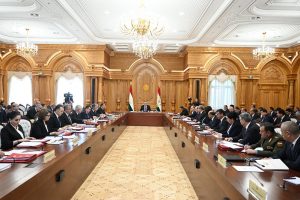 Meeting of the Government of the Republic of Tajikistan
Meeting of the Government of the Republic of Tajikistan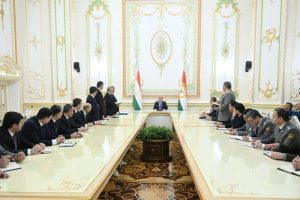 President Emomali Rahmon Makes Personnel Appointments
President Emomali Rahmon Makes Personnel Appointments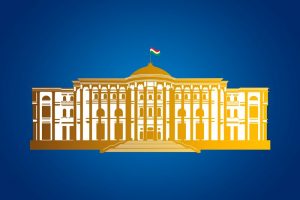 Congratulatory Message of His Excellency Emomali Rahmon, President of the Republic of Tajikistan, on the 33rd Anniversary of the Armed Forces
Congratulatory Message of His Excellency Emomali Rahmon, President of the Republic of Tajikistan, on the 33rd Anniversary of the Armed Forces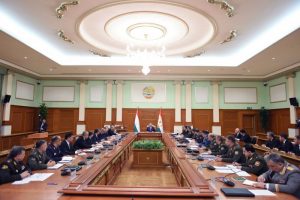 President Emomali Rahmon Holds Security Council meeting
President Emomali Rahmon Holds Security Council meeting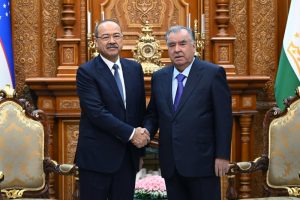 President Emomali Rahmon Receives the Prime Minister of the Republic of Uzbekistan Abdulla Aripov
President Emomali Rahmon Receives the Prime Minister of the Republic of Uzbekistan Abdulla Aripov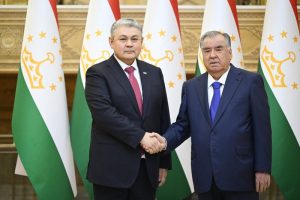 President Emomali Rahmon, Received the Minister of Foreign Affairs of the Republic of Kazakhstan
President Emomali Rahmon, Received the Minister of Foreign Affairs of the Republic of Kazakhstan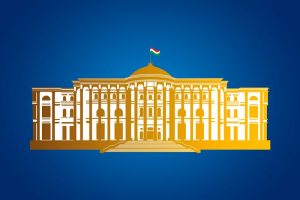 President Emomali Rahmon Enacts New Laws
President Emomali Rahmon Enacts New Laws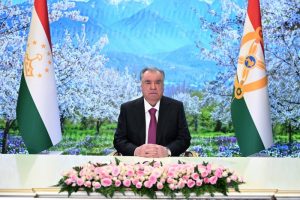 President Emomali Rahmon Sends Festive Greetings to President Xi for Chinese New Year
President Emomali Rahmon Sends Festive Greetings to President Xi for Chinese New Year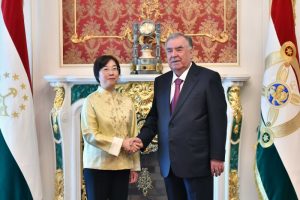 President Emomali Rahmon Receives AIIB President Zou Jiayi in Dushanbe
President Emomali Rahmon Receives AIIB President Zou Jiayi in Dushanbe














